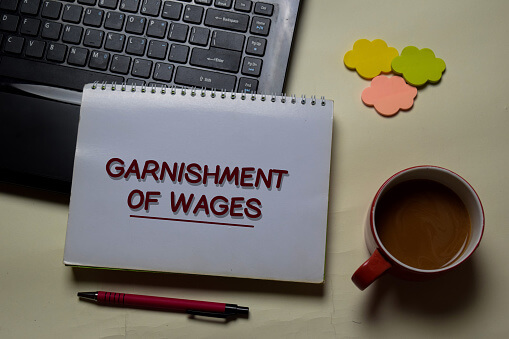What are Disposable Earnings? Information You Shouldn’t Miss!
Are you aware that creditors own a right to seek garnishment orders against you if you cannot repay the debts?
Many individuals are unaware of this law that if you cannot pay off your debts, creditors can get a right of garnishment and may directly garnish from your disposable income, popularly known as Disposable Earnings.
Technically, disposable earnings reflect an individual’s financial status, ability, and credibility to pay off their necessary living expenses.
Suppose a creditor gets a garnishment order against you; they might withhold a specific amount of your disposable income after making other legally required deductions and payment obligations.
At Nick Thomson law firm, you can rely on us for all types of legal help in your financial matters. With the help of this detailed post, you will get complete information about disposable earnings and associated factors with wage garnishment.
For more detailed information about any matter associated with bankruptcy, foreclosure, or student loan, or if you want to get any details about Kentucky state laws, schedule a FREE consultation now.
Disposable Earnings – A Brief Introduction
In simple words, disposable earnings are the remaining amount left in your account after paying for the essential taxes and other necessary payment obligations. Other significant payment necessities may include mandatory payroll deductions like social security, health benefit deductions, and taxes.
So basically, Disposable Income can be your savings or the money you can spend wherever you want and however you like.
Since local taxes, federal taxes, state taxes, and social security are mandatory for every individual to pay, they are not counted as disposable income. Nevertheless, life insurance, medical insurance, pension, and employee savings plan deductions are part of the disposable income.
This deductions variety has created a difference between take-home pay and disposable incomes.
Disposable Earnings for Garnishment

Disposable earnings or income can also be regarded as the portion of income available for wage garnishments. An individual’s income can be garnished once all legally mandatory payments have been deducted from the gross income.
When a creditor files a complaint petition against you, they can request the employer withhold a certain amount of your disposable income to repay the money you owe them. However, the creditor can only garnish your disposable earnings or income once a judgment is passed from the court about withholding or wage garnishments.
Before approving the garnishment orders, the court calculates your disposable earnings after deducting the essential and necessary payable obligations from your monthly income.
The necessary payable obligations allowed by the court are as follows:
- Child support and alimony
- Housing
- Childcare expenses
- Food
- Health insurance premiums
- Utilities
- Life insurance premiums
- Transportation
- Clothing

The expenses, such as gym membership fees and subscriptions to specific non-essential programs, are considered unnecessary by the court and do not qualify for the allowable deductions.
After deducting allowable expenses from your monthly gross income paycheck, the remaining amount can be garnished back to the creditors.
It usually happens that individuals having their wages garnished are not even aware of their wages being garnished unless they notice a decrease in the amount on their paycheck.
This can happen when they fail to respond to the garnishment notice or complaint filed by the creditor or if they are absent on the hearing day in court.
Additionally, some entities, such as Internal revenue Services, do not need a court’s permission for wage garnishment. However, the IRS must still issue a notice before garnishing your wages for the payment of taxes.
How Much Money Can be Garnished from the Employee’s Paycheck?
Creditors must go through a process before filing a lawsuit against an individual. The court can allow or deny the case depending on the situation and circumstances.
If the creditor wins the lawsuit against an individual and the debtor does not accept his terms, the court then grants the creditor a judgment of permission for the wage garnishment from the individual’s disposable earnings.
According to federal laws, there are limits on the wage garnishment amounts that can be withheld from the creditor’s account. Moreover, states can impose stricter laws and conditions if they wish to do so.
However, Kentucky state laws have not imposed strictness in this regard, so it follows the federal regulations for the garnishment of disposable income. The primary idea is you must still have enough amount left in the account to live on.
According to Federal and Kentucky Laws, wage garnishment can not be more than 25% of the average disposable income each week.
It should not exceed the total by which weekly disposable earnings surpass 30 times the federal minimum wage, whichever is less. As 30 x $7.25 results in $217.50, if the weekly after-tax income is less than $217.50, you are not allowed for wage garnishment.
If you earn $500 a week in disposable earnings, only $125 is eligible for wage garnishment. It is because 25% of $500 results in $125, which is less than the federal minimum wage, which surpassed the 30 times weekly amount.
Once the court grants permission for wage garnishment, the employer must withhold that specific amount and send them straight away to the creditor for payment. This will happen with every paycheck unless the individual can pay off the debt.
In addition, an individual can also choose to send additional payments to clear the debt quicker.
Is There Any Exception for Wage Garnishment Limits?
Some exceptions are associated with the wage garnishment limits that are not required a judgment beforehand. For instance, IRS doesn’t need a court judgment for wage garnishments; however, they are bound to send a notification before doing so.
Another exception associated with wage garnishment includes bankruptcy court orders exempt from traditional wage garnishment procedures. If you want more information about the bankruptcy procedure or are considering bankruptcy as your last resort, contact Nick Thomson to get all the guidance and expert opinions.
Disposable Income Calculation
Disposable income is calculated by subtracting the payment obligations’ total from the total gross earnings monthly amount. These deductions include federal income tax debts, state disability insurance, social security, and state income tax.
Firstly, you must have a confirmed amount of your monthly gross income to calculate disposable income correctly. Let us consider your gross earnings amount is $100,000. Next, take note of your state, local, and federal tax rates.
For this example, we are considering the Kentucky state tax rates. The effective tax rate is 29.82%. By multiplying this number with your income total, you can figure out how much you will be spending on income taxes.
So, $100,000 – 0.2982 = $29,820
With an annual income of $100,000, you have to pay $29,820 in taxes per year in Kentucky. Now, subtract this number from your gross yearly income amount to get the number of your disposable income.
That means: $100,000 – $29,820 = $70,180
Thus, the disposable income amount is $70,180 in this case.
What if Wage Garnishment is Causing Hardship?
If employee’s disposable earnings are causing financial hardship, they can file for an exemption claim for wage garnishment.
As per the claim exemption for the employee’s disposable earnings, they can ask the court to reduce the wage garnishment amount. Alternatively, to prevent employee’s disposable earnings from garnishment, they can consider bankruptcy to discharge some debts.
Keep in Mind:
Bankruptcy will not discharge your student loan responsibility, child support payments, and specific types of taxes.
Contact Professional Attorney to Handle Your Wage Garnishment of Disposable Income with Complete Command!
I care for my clients and do not want them to go through all the financial and mental stress of increasing debts. I understand bankruptcy laws and strategy.
Whether you are considering bankruptcy and wondering what are disposable earnings, how to calculate disposable personal income, and how to get yourself out of this tricky and complicated financial situation, I am here to guide you through all the matters. Contact my law firm immediately or fill out a form on my website and manage your finances with the best solutions.

Resources for Bankruptcy
Louisville Kentucky Bankruptcy Forms
Louisville Kentucky Chapter 7 • 341 Hearing • Video
Chapter 13 Step Plans & Chapter 20 Flexibility to Make a Plan
Chapter 7 or 13 Bankruptcy Trustees and the 341 Hearing
Trustee Questions at the Bankruptcy 341 Meeting
If you are considering bankruptcy, don’t delay because timing is often crucial. Don’t trust the bank or their attorney for advice. I am here to help you. So, contact my office immediately to start the conversation—Nick C. Thompson, Bankruptcy Lawyer: 502-625-0905.







